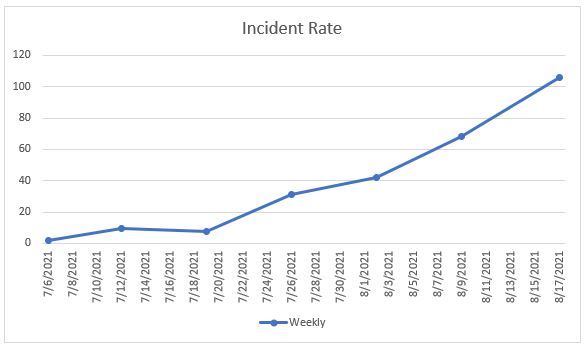In response to questions from the public over the last couple of months, and recent statements made by a former trustee, Mid-Continent University has issued a statement regarding the school's closure.
The school asserts that they are not trying to withhold information from the public, but are trying to make sure that only the correct information is being passed along to avoid confusion.
Since the school's financial circumstances became public knowledge in February, public comments by some members of the board of trustees, including Gale Hawkins, differed from statements issued by the school's President, and created situations where trustees had to divert attention from time-sensitive projects to clarify, correct or explain. Based on what the school calls "inaccurate and slanderous" statements made to the media and a regulatory agency by Hawkins about MCU Vice President of Administration and Finance Tim Walker, the board voted July 14 to remove Hawkins as a trustee.
The press release said the problems with release of student financial aid funds were an institutional problem, not just with the financial aid department. Every school department submitted information, and what was submitted to the U.S. Department of Education was only as accurate as what was received in the financial aid office. The DOE determined that MCU should have been meeting regulations on a different schedule than the school was using, and that required re-calculation of records for a 3-year-period. It also required new school policies be put in place. Since 2011, the expense of trying to meet those regulations and correcting 19 deficiencies in financial aid submissions has exceeded $2 million.
Relating to comments made by Hawkins to media outlets, the school's statement said MCU was not a "student mill," and their accreditation with the Southern Association of Colleges and Schools assured that all student programs and requirements were met. They say enrollment swelled because the Advantage Program was a convenient and affordable way for adults to get a degree without having to commute to the school. More than 4,000 adults got degrees through this program.
Regarding rumors and claims that admission standards were too low, MCU said none of the school's problems with the Department of Education were related to admission standards, and no trustee brought information to back those claims during board discussions of those rumors.
As for Hawkins' claims that MCU enrolled students who would not succeed so they could collect more government grant money, the school said each student's situation was different, but since the school must return part of the unused tuition to the government, they had no incentive for this type of policy.
The statement said a skeleton crew of employees is still working to meet the requests of regulators, and to respond to student requests for transcripts and other information. The board is also committed to finding a use for the campus, and has appointed a committee to study and pursue those opportunities and options.
Here is the complete Statement from Mid-Continent University:
"PUBLIC COMMENT
The trustees, acting president and senior staff at Mid-Continent University recognize the interest and concerns of the public and in no way are we intentionally withholding information. The difficultly is that the issues are complex and that we’re dealing with regulatory agencies and legal issues.
Some discussions and information are sensitive and premature comments, misinterpretation of comments or misrepresentation of comments could cause misunderstandings that would unintentionally derail progress that is being made. We remain committed to getting information directly to students as soon as possible.
We are releasing this statement in an effort to answer some frequently asked questions and to clarify misinformation and misconceptions. We know it doesn’t answer every question and concern, and we’ll make additional comments when appropriate.
We have every intention that in the near future, the story of MCU’s end to Title IV federal student aid instruction will be told in detailed, but understandable format. We ask again for patience and understanding.
BOARD, ADMINSTRATON PRIORITIES
The top priorities of the trustees and administrators at Mid-Continent University are to continue providing crucial services to benefit former students, provide requested information to regulatory agencies and manage assets to pay vendors, faculty, staff and creditors.
We are committed to finding a use for the campus in Mayfield to continue the mission of using it to win the lost to Christ and to restore jobs. To meet that goal, the board of trustees appointed a committee that is studying options. The senior staff also is working daily to study and pursue opportunities.
A skeleton crew has been working extremely hard to carry out the priorities. Each remaining employee is multitasking and working diligently on time-sensitive matters to meet the requests of regulators and respond to student requests for information such as transcripts.
TRUSTEE DISMISSAL
One issue that trustee Chairman Tom Butler would like to clarify is the July 14 action by the trustees to remove Mr. Gale Hawkins from the board for violating a unanimously approved board policy that limited comments to the acting president or his designee. Mr. Hawkins did not oppose the policy, which was approved at two different meetings.
Mr. Butler emphasized that the board action was not an attempt to place a “gag order” on board members, but was done out of concern voiced by two acting presidents that miscommunication and inaccurate information was being released to the news media and regulatory agencies. The acting president was picked as the official spokesman because he has access to complete, up-to-minute information and details of crucial and complex issues.
On the occasions when others misspoke, Butler said the acting president and staff members working on crucial time-sensitive projects had to take time to clarify inaccurate statements, not only to the public but to regulators and stakeholders who are crucial to the future. It took time away from critical work that needed to be done.
Mr. Butler also said Mr. Hawkins should have raised concerns and sought answers to questions in board meetings, and not in comments to the media and outside agencies. He said most of the issues could have been clarified by asking questions in board meeting and talking to administrators.
Mr. Butler noted that it also served as a distraction for the board as it was trying to deal with critical issues. He said the board felt it necessary to respond after Mr. Hawkins, while still on the board, made inaccurate and slanderous statements alleging that Tim Walker, vice president of administration and finance, was not being truthful. Comments not only were made to the news media, but to at least one regulatory agency that Mr. Walker was dealing with almost daily. Mr. Butler said Mr. Walker has not misled the board in any way.
Trustees responded with the unanimous approval of a resolution supporting administrators and giving them a vote of confidence. The resolution said members of the administration “have been personally and professionally attacked in a way not at all adhering to the mission of the university.” It said the attacks came in the form of “accusations and innuendoes” made in leaks to the news media.
REJECTION OF REQUESTS FOR FUNDS
It also is necessary to clear up any misunderstanding about the role and work of the former Financial Aid Executive Director Paula Clendenen and her staff as it relates to the rejection of requests filed with the U.S. Department of Education to release student financial aid funds.
With only a few exceptions, every department of the institution funneled records and reports to the financial aid department containing information required for each student’s record. A problem with a financial aid submission could therefore be found in records provided by almost any department of the school.
Information compiled by the financial aid staff was only as accurate at the information being provided by others. The submission problems were institutional problems. The financial aid department worked diligently and with integrity in providing information to all agencies.
Responding to the U.S. Department of Education’s 19 findings of deficiencies in the financial aid program has been difficult and complex. In addition to hiring a new staff member with expertise in financial aid, the administration used the advice of the country’s top federal financial aid consults and attorneys, and advice from local attorneys. The cost of that advice since 2011 has exceeded $2 million.
The issues were complex because the U.S. Department of Education concluded the university should have been meeting regulations as a “non-term” school since adult Advantage cohorts began on staggered schedules, rather than “term” regulations pertaining to students attending the traditional fall and spring semesters. It required major recalculating of records for a three-year period involving hundreds of students. It also required major new policies and procedures to comply with non-term federal regulations.
CLARIFICATION OF JULY 23 COMMENTS
We also want to clear up some of the issues raised by Mr. Hawkins in a July 23 news story published in the Paducah Sun:
• Enrollment grew because of the unique adult program that allowed students to attend classes one night a week and -- for some of those with previously earned college credits -- could earn degrees in less than two years. Affordability and accessibility were the primary reasons for the increase in enrollment because classes were offered in dozens of communities throughout Kentucky and southern Illinois. Students who had earned previous college credits could continue to work full time and earn degrees in their communities. More than 4,000 adults received degrees since the program was started.
• MCU was not a “student mill.” The academic program and requirements were approved and accredited by the Southern Association of Colleges and Schools Committee on Colleges.
• The university’s problems with submissions to the U.S. Department of Education were not the result of weakened admission standards. None of the 19 findings in a DOE program review were related to weak admission standards.
• Rumors about lower admission standards were addressed in board of trustee meetings. No trustee provided facts or documents to back the claims, which one board member said came from an unidentified former financial aid counselor.
• Approximately 90 percent of the students were eligible for some form of state and federal financial aid that included grants that didn’t have to be repaid, subsidized loans, and unsubsidized loans. The financial aid package for each student was based on federal guidelines that took into account financial need based on income, family obligations, cost of tuition and fees, and estimated living expenses.
• It is possible some students may have enrolled with the main motivation of collecting the cash residuals rather than earning degrees. That unfortunately is common at any institution of higher education. If that was their motivation, they still had the responsible of repaying their loans, part of which funded the residual payments. Federal regulations require that if a student drops out, the university in many cases has to refund at least a portion of the unused tuition to the federal government. MCU had no financial incentive to recruit students it knew would not succeed.
• It is true that a few adult students may have been admitted with grade point averages of less than 2.0, which is permitted. Often, students who didn’t do well in high school are highly motivated as adults and deserve a chance to succeed in college. Once admitted, they are required to maintain minimum standards to continue receiving financial aid.
• The story was incorrect in stating that former President Robert Imhoff and his wife, Jackie Imhoff who was vice president of adult services, resigned. Both were fired by the board of trustees.
• The independent auditors for MCU work for the Board of Trustees. Trustees have access to financial audits and other financial records. Documents were provided to members of the finance committee and others could down load the copies from a special website. If requested, they also would be given hard copies. The independent auditors also presented FY 2013 to the Board Finance Committee in person and answered all questions concerning their findings and recommendations."
Advertisement
Mid-Continent Comments on Hawkins, Financial Aid
Advertisement
Latest Western Kentucky
Western Kentucky
Feb. 16, 2023
Western Kentucky
Aug. 18, 2021
Western Kentucky
Aug. 14, 2021
Western Kentucky
May. 27, 2021
Western Kentucky
Apr. 27, 2021
ADVERTISEMENT
Most Read >
ADVERTISEMENT
Latest Western Kentucky
Western Kentucky
Feb. 16, 2023
Western Kentucky
Aug. 18, 2021
Western Kentucky
Aug. 14, 2021
Western Kentucky
May. 27, 2021
Western Kentucky
Apr. 27, 2021
Advertisement
ADVERTISEMENT





